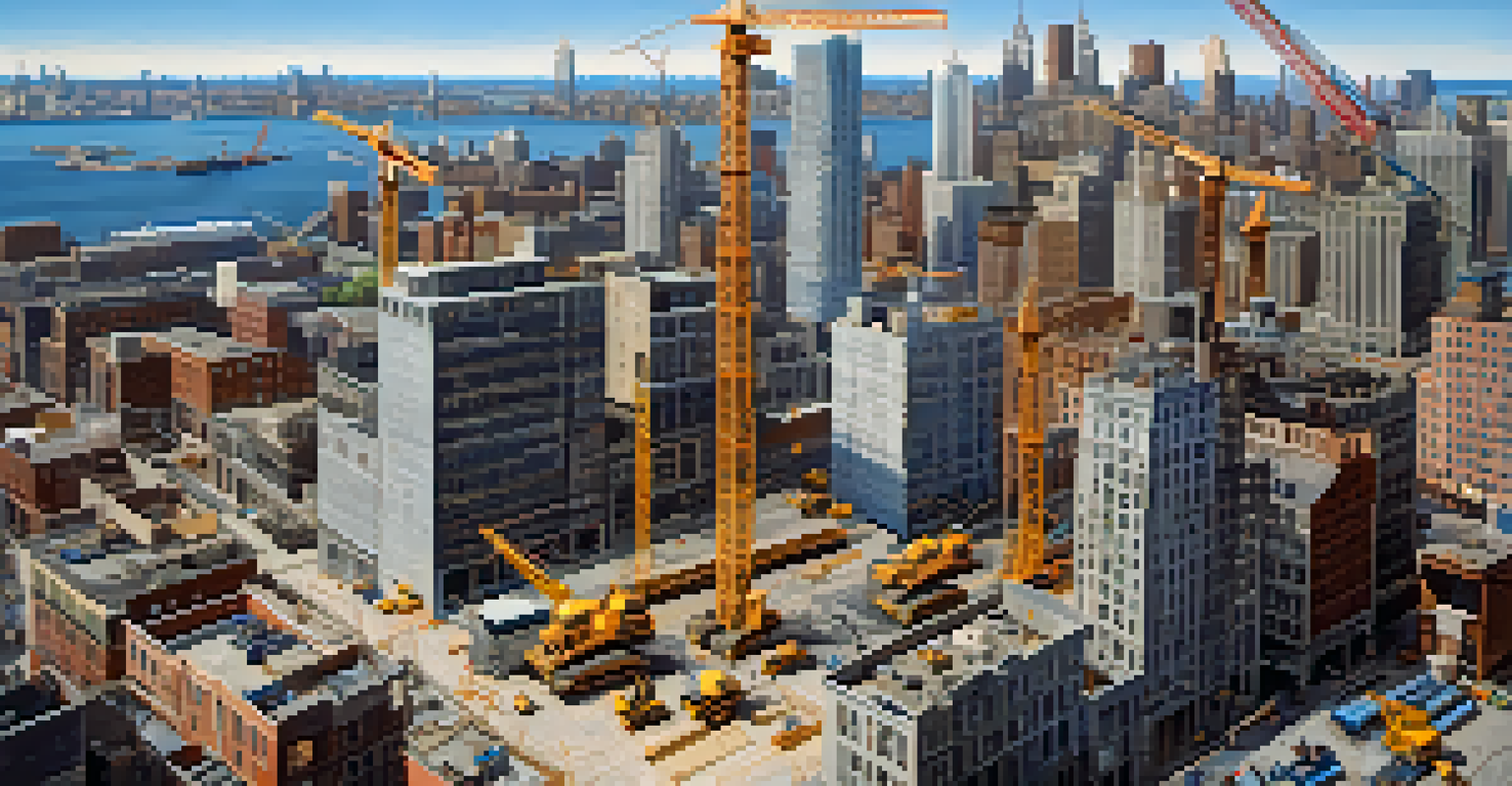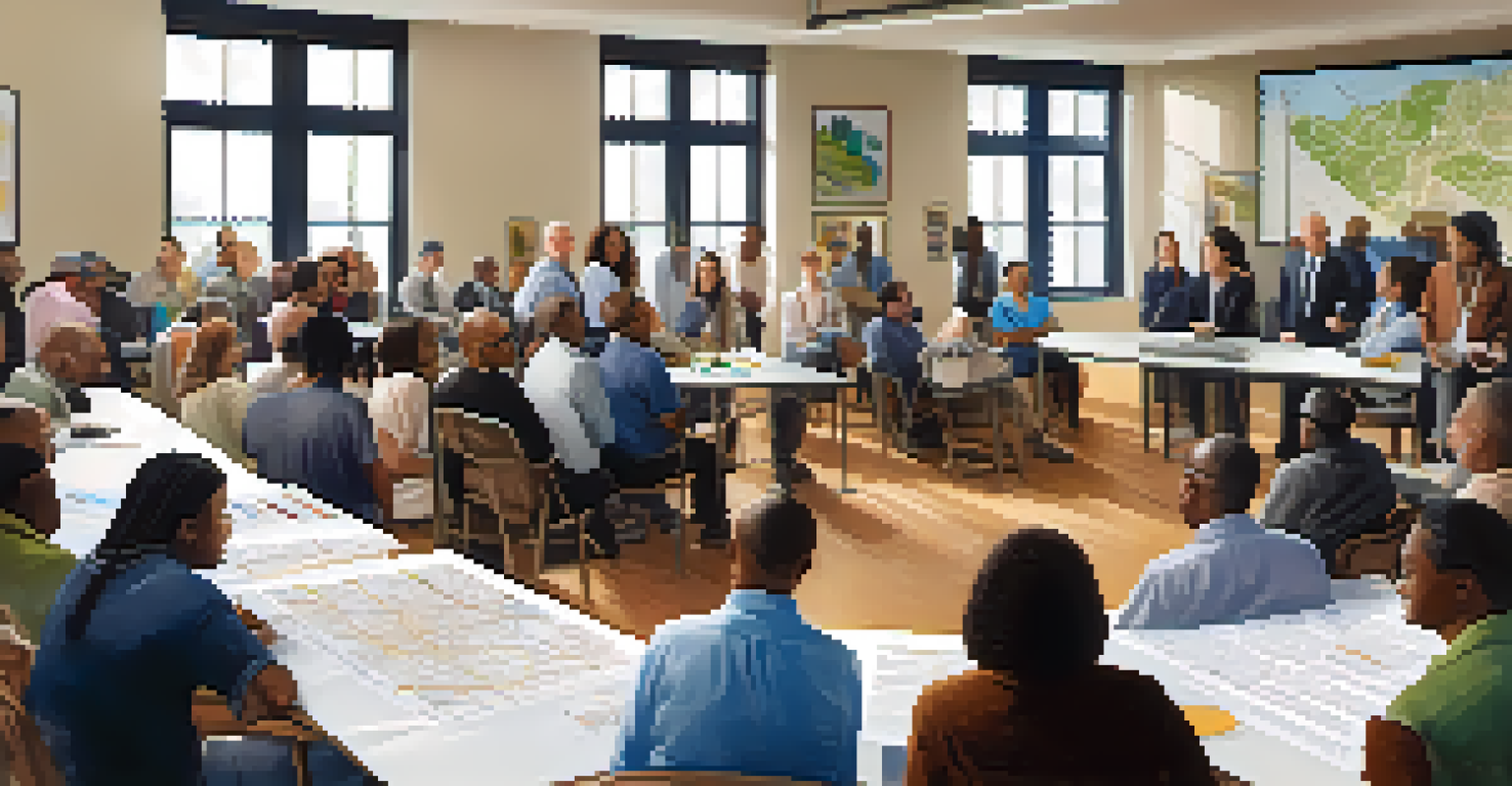Key Real Estate Development Regulations in NYC Explained

Overview of Real Estate Development Regulations in NYC
Navigating the landscape of real estate development in New York City can feel overwhelming. With its unique blend of local laws, zoning codes, and community guidelines, developers must grasp these regulations to succeed. Understanding the framework of these rules is crucial for anyone looking to invest in or develop property in the city.
Real estate development is not just about buildings; it’s about building communities and enhancing lives.
Real estate regulations in NYC are designed to ensure that development aligns with the city's broader goals, such as housing availability, environmental sustainability, and community needs. These regulations vary significantly based on the neighborhood or borough, reflecting the distinct character of each area. By familiarizing themselves with these rules, developers can better align their projects with city objectives.
Keeping up with these regulations not only helps in avoiding legal pitfalls but also enhances the potential for project success. A thorough understanding fosters better communication with stakeholders, including community boards and city agencies, ultimately leading to more successful projects.
Zoning Laws: The Backbone of NYC Development
Zoning laws are fundamental to real estate development in NYC, dictating how land can be used. They classify areas into different zones, each with specific rules regarding the types of buildings allowed, their heights, and their uses. For instance, a residential zone may prohibit commercial developments, ensuring that neighborhoods remain livable.

These zoning regulations are essential for maintaining the city's character and managing growth. Developers must conduct thorough research to determine the zoning classifications of their target sites. This knowledge can significantly influence project design and feasibility, ensuring compliance with the law and community expectations.
Navigating NYC's Complex Regulations
Developers must understand various local laws, zoning codes, and community guidelines to successfully invest in or develop property in New York City.
Additionally, zoning laws can be complex and subject to change, often requiring developers to stay updated on local amendments. Engaging with local planning boards early in the development process can help navigate these challenges and foster positive community relations.
The Role of the NYC Department of Buildings
The NYC Department of Buildings (DOB) plays a pivotal role in regulating construction activities throughout the city. This agency oversees building permits, inspections, and compliance with safety codes, ensuring that all developments meet the required standards. For developers, understanding the DOB's processes is vital to avoid project delays.
In the end, the community decides what is built and how it affects their lives.
When a developer submits plans for a new project, the DOB reviews them to ensure they conform to zoning laws and building codes. This review process can be intensive, and any discrepancies can lead to significant setbacks. Therefore, preparing thorough and accurate documentation is crucial for a smooth approval process.
Moreover, the DOB also conducts inspections during the construction phase to ensure ongoing compliance. Developers who maintain open communication with the agency can navigate these requirements more efficiently, ensuring that their projects stay on track and adhere to city regulations.
Environmental Regulations Impacting Development
In New York City, environmental regulations are increasingly influential in the real estate development process. Developers must consider the potential environmental impacts of their projects, such as air quality, water management, and waste disposal. This ensures that developments contribute positively to the urban environment and comply with state and federal laws.
The New York State Environmental Quality Review Act (SEQRA) requires developers to assess the environmental implications of their projects. This review process can be extensive, necessitating environmental assessments and public comment periods. Understanding SEQRA and its requirements is crucial for developers to avoid delays and potential legal challenges.
Community Engagement is Crucial
Active participation and dialogue with local community boards and residents can significantly enhance the success and public perception of real estate projects.
By prioritizing sustainable practices and complying with environmental regulations, developers can not only meet legal obligations but also appeal to an increasingly eco-conscious market. Projects that emphasize sustainability often attract more interest and support from the community, enhancing their overall success.
Community Engagement and Public Review Process
Community engagement is a critical element of the real estate development process in NYC. Developers often need to present their projects to local community boards and residents, fostering dialogue and addressing concerns. This engagement can significantly impact public perception and the overall success of a project.
The public review process allows communities to voice their opinions on proposed developments, ensuring that local needs and concerns are considered. Engaging with the community early on can help developers identify potential issues and adapt their plans accordingly. This proactive approach often leads to smoother approvals and community support.
Developers who prioritize transparency and open communication build trust with local stakeholders. This relationship can lead to valuable partnerships and support, ultimately enhancing the project's viability and success in the long term.
Financing and Incentives for Development Projects
Securing financing for real estate projects in NYC can be both challenging and rewarding. Various funding options are available, including traditional bank loans, private equity, and public grants. Developers need to explore these avenues to ensure they have the necessary capital to bring their visions to life.
Moreover, NYC offers several incentives aimed at stimulating development, especially in underserved areas. Programs like the 421-a tax exemption encourage developers to build affordable housing by providing tax breaks. Understanding these incentives can significantly impact a project's financial feasibility and overall success.
Sustainability Shapes Future Development
An increasing focus on sustainability and affordable housing is influencing the evolution of real estate development regulations in NYC.
Navigating financing options and incentives requires careful planning and expertise. Developers who work closely with financial advisors and city agencies can uncover valuable opportunities, making their projects not only sustainable but also financially viable.
Understanding Building Codes and Safety Regulations
Building codes and safety regulations are critical components of the real estate development process in NYC. These codes set standards for construction practices, materials, and safety measures, ensuring that buildings are safe for occupants and the public. Developers must familiarize themselves with these regulations to ensure compliance and avoid costly penalties.
The NYC Building Code outlines specific requirements for various types of construction, including residential, commercial, and mixed-use developments. Adhering to these codes is not only a legal requirement but also a best practice that enhances the project's quality and safety. Developers should engage qualified professionals, such as architects and engineers, to navigate these regulations effectively.

Additionally, safety regulations often address emergency preparedness, fire safety, and accessibility. By prioritizing compliance with these codes, developers can create safer, more resilient buildings that contribute positively to the urban landscape and community.
The Future of Real Estate Development Regulations in NYC
As New York City evolves, so too do its real estate development regulations. Trends such as increased emphasis on sustainability, affordable housing, and community engagement are shaping the future of development in the city. Developers must stay informed about these shifts to adapt their strategies accordingly.
Recent movements towards more flexible zoning laws and streamlined approval processes aim to facilitate development while addressing community needs. These changes reflect a growing recognition of the importance of balancing growth with livability. Staying ahead of these trends can provide developers with a competitive edge in a dynamic market.
Understanding NYC Zoning Laws
Zoning laws dictate land use in NYC, making it essential for developers to research and comply to ensure project feasibility.
Ultimately, the future of real estate development in NYC will require a collaborative approach. By engaging with city officials, community members, and industry peers, developers can navigate the evolving regulatory landscape and contribute to a more sustainable and vibrant urban environment.